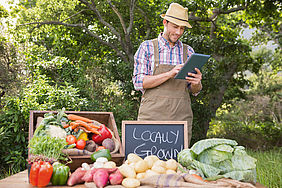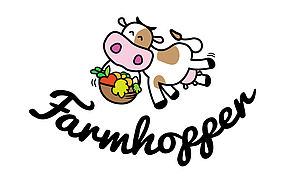Local farmers' markets are nice, but only a small fraction of consumers regularly visit and shop in them, partly because they are not easy to find, have limited availability or customers are unsure about the origin and naturalness of the products.
But this is set to change: Farmhopper, an EIT Digital supported innovation activity within the Digital Finance focus area, will allow environmentally-conscious consumers to get easy access to fresh groceries, while at the same time enabling farmers to build their reputation, showcase and sell their products to a wider audience and receive adequate payment.
"In Hungary there are many local markets where you can buy fresh food; however, they don't scale, because customers need to know their exact location, and they don't have a catalogue of what's on sale. Many of them are also open only one day or a few days a week, which is also part of the problem," the project manager of the activity leader E-Group, Ágnes Bányai, says.
Farmhopper, which will be accessible both as a website and a mobile application, will overcome all these hurdles by building a software platform which takes care of all the processes related to the agricultural value chain (onboarding, creating and maintaining marketplaces, order management, payments and billing).
Acting as a digital middle layer, the platform will provide customers with all the necessary logistical information and also contain a catalogue of the products on sale. Consumers will be able to select their favourite groceries and place an order, using a secure credit card payment solution provided by OTP Bank, one of the largest independent financial services providers in Central and Eastern Europe.
The initiative started in September 2018, with an initial focus on the Hungarian market involving E-Group as activity leader and OTP Bank and KTH as partners. One of the main features of the platform, which distinguishes it from other websites and apps that simply aggregate fresh-food offers, is the introduction of the "community host", a person who will build the network of farmers and consumers, organise events where they can meet and also handle any potential problems.
"Customers will pay in advance and just pick their order at the event. If there is a problem, for instance, the quality and quantity is not right, the community host will jump in, resolve the issue or refund the purchase," Bányai says.
In line with the so-called "reputation economy" methodology, to make sure everything runs smoothly, farmers belonging to the Farmhopper platform will be rated by customers based on their behaviour.
The community host will take a cut on the financial transactions generated by the community, and the platform providers will also take a commission. "It's similar to a franchise method - we provide the tools and community hosts then use their expertise and knowledge about what consumers need in their network," Bányai explains.
The first step of the Farmhopper product implementation has been extensive market research on the appeal of agricultural online marketplaces. It revealed that in Hungary, around 800,000 of a total of 5.7 million 18-69 year old Internet users could be potentially interested in trying the platform. Of these, 10% would be willing to take up the role of community host.
The first demo launch to test the functionalities on small community will happen this autumn. By the end of 2019, a startup will be created to support the commercial launch of the platform. Farmhopper will be launched in Hungary first, but the consortium plans international expansion in the future.


